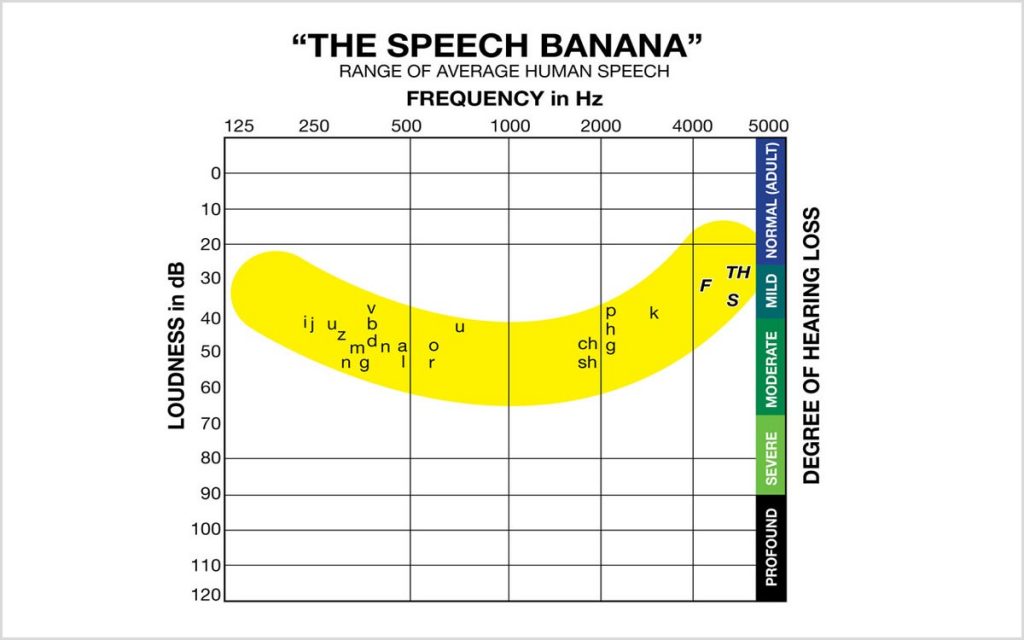Certain words are becoming harder to hear. That has you flummoxed, as you aren’t quite sure what to make of the distorted, muffled voices you’re hearing. It’s not as though everything is getting harder to understand–just specific words. It can even strike at odd times–in the middle of a friendly chat or at an important work meeting or while you’re watching TV. Suddenly every other word turns into an indistinct mess.
And then you remember what it must be, the only thing it can be, the single cause that makes sense: It must be because of the speech banana.
What is the speech banana?
In Douglas Adams’s comedic science fiction novel, The Hitchhiker’s Guide to the Galaxy, the main characters understand each other because they place a creature (called a Babel Fish) in their ears. The fish acts as a translator, allowing anyone wearing it to understand a multitude of alien languages. A speech banana is kind of like the exact opposite of the Babel Fish.
First and foremost, the speech banana is not something you put in your ear. In fact, the only place you’ll ever see a speech banana is on a sheet of paper (or, I suppose, a computer screen). The term Speech Banana refers to how the audio frequencies of common speech sounds are charted on a special graph called an audiogram.
When you plot the relative loudness of these sounds against their inherent pitch on an audiogram, you get a vague banana shape. Sounds like “j” are low volume and low pitch. Sound like “f,” “s,” and “th,” are loud and high pitched. Everything else fills the vague “banana” shape in between. (So, alas, it’s not a real banana, and no, you can’t eat it.)
How does the speech banana mess with my hearing?
The speech banana is essential because of the way hearing loss works. For most people, hearing loss tends to develop one small step at a time (often, it’s so slow and subtle you don’t even notice it happening).
This means that specific frequency ranges tend to be affected first. So maybe your ability to hear very high-pitched or very low-pitched sounds fade away, but your ability to hear all those medium pitch sounds is as healthy as ever.
In this scenario, you can easily see how your ability to hear “f,” “th” or “s” sounds would be suddenly compromised. And there are a lot of words that rely on those sounds. So your ability to understand human speech might seem to fade in and out inexplicably, even though every single background noise seems as loud as ever. A hearing screening can determine the parts of speech you have difficulty discerning and whether it’s affecting your ability to understand speech.
How do you know if your hearing loss is in the speech banana?
The speech banana can only be seen on audiograms, but if you get your hearing screened regularly, it can also be a kind of red flag. If your hearing loss starts to encroach on the speech banana, your communication could get a bit more challenging. Here’s how you might know that your hearing loss is entering speech banana territory:
- Specific words suddenly become harder to hear.
- Sounds of certain words start dropping out; maybe it sounds like you’re listening to a radio that can’t get good reception.
- Words sound muddied, distorted, or garbled.
- You have a harder time hearing some people than others (for example, a harder time hearing men than women or vice versa)
How can the speech banana help me?
No matter what its name might imply, the speech banana is not an animated, magical friend here to assist you on a quest (though, that might not be a bad idea for a children’s book).
But that doesn’t mean the speech banana isn’t helpful.
Knowing which sound pitches are most compromised helps your specialist identify and treat your hearing loss.
Most hearing aids, after all, can be finely tuned to amplify specific frequency ranges, ignoring others. The better you can hear the frequencies and volumes covered by the speech banana, the better you’ll be able to communicate. Babel fish don’t exist. So protect your speech banana. It’s the next best thing.



